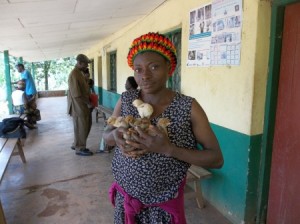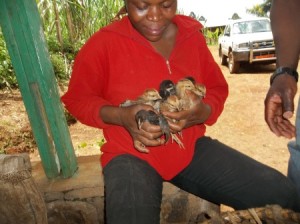“In the North West Region of Cameroon, a person who isn’t raising some animal or fowl is looked upon as distrustful. An issue that has been identified is that animals have not been raised properly and a lackluster behavior regarding the care and feeding of animals many times leads to a health risk to the people and animals that come in contact with them.
Since CWR has given a grant to raise chickens, we have a heightened awareness of the need to educate the residents of the quarters where they are raising our chickens about being good stewards for the animals and their own bodies. Since June, we have been working alongside of Dr. Napoleon to provide free vaccinations to the goats and fowl of the area.
Camvet is a veterinary missionary outreach service of Dr. Napoleon’s veterinary practice, to promote animal welfare, healthcare and wellbeing to poor rural communities of the Western Highlands of Cameroon through a concerted approach that promotes and shares the concept of the Good Shepherd, JESUS CHRIST between care givers and care receivers.
Camvet does this not only as a social responsibility but with a strong sense of professional consciousness drawn from an innate inspiration and call to protect and care for the resources that God has given us and the primary responsibility He gave us at THE BEGINNING OF TIME (Genesis Ch 1: 20-28)
I would like to show you how this relationship is growing.

Anthalia and her chicks
Anthalia and Josephine brought their chicks to be vaccinated on the ring vaccination date. This day was only for fowl that had been vaccinated in the first round in June. It was not for newcomers. In a basket each of them had their hens. In a plastic sack between the two of them they had a total of 22 chicks. This was a pleasant surprise to Dr. Napoleon; we were not expecting chicks this time. The women were so excited to tell what has been happening with their hens.
The hens are laying larger, stronger eggs. Also they are laying more eggs. And the best part is the chicks are strong when they are hatched and all survive. They were so excited! This has never happened before. Others are agreeing. They see an improvement in their fowl and goats. More people are noticing and asking what are they doing. This day the Lord Mayor sent a messenger to welcome us. He would like to meet us to see how “this thing” can be carried out over the entire sub-division.
Anthalia had two hens and 8 chicks. She is 28 years old, married with 3 girls ages 6, 9 and 12. In addition to the chicks, her other hens are laying eggs and they are eating those eggs. Within one week, Anthalia ate five eggs. In her entire life, she has never eaten that many eggs in one week. Never! Her family is also eating eggs and she still has her chicks to rise.

Josphine and her chicks 9.28.12
Josephine has a similar story. She has three hens and they had a total of 17 chicks, until that morning when a wild cat ate 3 chicks. Josephine is 32 years old, married, with two boys, 11 and 13 and two girls ages 7 and 9.
What makes this gathering different is that the pastor of the village of Njinikejem, makes the announcement of the date and he’s present on that day. He is the spiritual leader of most of these participants. When we arrive, the people are waiting for us. We go up to each person and greet them. We open in prayer and a song. We don’t rush into the business of vaccinations. We sit around and talk. It’s not a lecture. It is a conversation among friends. We talk about what has been going on since the last time we met. We take the time to listen and show love and respect to each other. We talk about our responsibilities to the animals, water, trees, soil and our bodies. Look how good God is to you. We talk about giving thanks for the healthy animals and how God is making them more abundant. Don’t forget your responsibility of making offerings and tithes we including in our conversation.
The atmosphere is comfortable and friendly people feel free to ask questions or exchange information without being judged.
- Why did my cock go away for three days and come back with a hen that is not mine? The doctor said he was lonely and wanted a companion. You didn’t have a hen around and he went and found one. We all laughed.
- Why do the chickens go off and stay all day and only come home at night? Do you leave fresh water out and put your left over fufu out for them to eat? No. You always have corn waste and other food waste. If you give them just a little bit of food they will not go so far.
- How do I keep them safe? I can’t afford to build them a house? We need to teach you how to make them.
- Do you know I have a fowl with a very long, curled neck that dances when my children sing? That fowl is called a goose. Those that have seen the goose dance when her children are practicing for the children’s choir confirmed it dances. I said I have to come see this dancing goose. We laugh again.
- When do we bring our goats back? “During the dry season”, Doc replies.
Doc tells them the dry season will soon be here and the chicks are in danger of the hawks. As the bush dries up and the small animal population declines, the hawks come closer and closer to the compound where it knows chicks will be present.
In addition to the hawks, the wild cats are dogs are on the prowl. The doctor said we need to teach you how to make cages from the bamboo and other grasses around the village so you can build a safe house for the country fowl at night and a place the laying hens can keep their eggs and chicks safe. We will plan a time in the near future.
It’s time to register the fowl and get them vaccinated. Dr. Neapolitan complements each bird, the improved color of its cone or “you need to clean the house” on and on. The people wait patiently for their turn. There is no hurry. Each one will have time with the doctor. In addition, this is a gathering of friends. The day is a country Sunday. There is no need to hurry off to the farm today. Soon every fowl has been seen by the vet. We start packing up. Dr. N sends the vaccines back with me to be given to his assistant in the office. He’s going on with a veterinarian intern to see some of his larger patients, cattle and horses. Where he’s going he will have to park his truck, and walk. Then he’ll get to a place where his horse is waiting for him and ride horseback the rest of the way. He’s due back to his office Monday. He hopes to be home with his family late Saturday night in time to attend worship service on Sunday.
Why is this important to the CWR chicken project in Cameroon? Because, if we didn’t vaccinate these fowl, the possibility of our Agri chickens getting an illness from them is very likely. It is a preventive measure, or I’d like to say, it’s being a good steward of God’s things.”
Praise God for lives being transformed through something as simple as a family of chickens!



me and my wife have been following your website regularly in 2013 so we will be here in 2013 also ! greetings and happy 2013 for you !!
Report This Comment
01.25.13 at 6:59 am